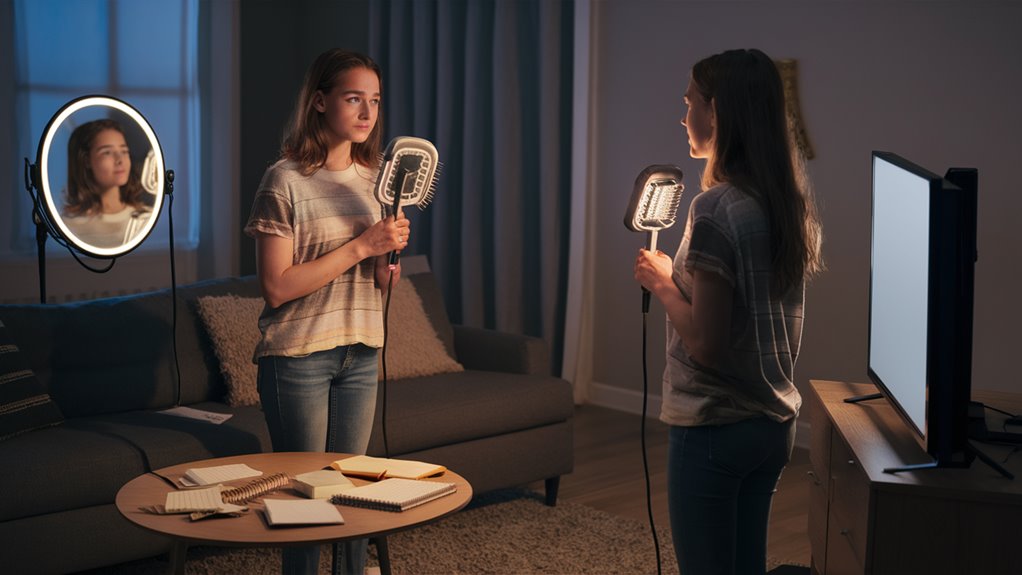
Karaoke for Starters: Sing with Sureness

Key Song Picks and Getting Ready
Start by selecting songs under 4 minutes that suit your voice. Choose tunes with easy, memorable hooks to build confidence.
Practice Ways to Do Well
Improve with daily 15-20 minute practice sessions. Record and review your singing to improve pitch and timing. Consistent practice strengthens your voice.
How to Use the Mic and Look Good on Stage
Hold the mic properly at a 45-degree angle, 2-3 inches from your face. Maintain a confident stance with feet apart to enhance sound and stage presence.
Ready for Show Day
Transform nerves into positive energy with proven methods. Arrive early to familiarize yourself with the venue. Stay hydrated, and engage with the audience by making eye contact.
Pro Tips for Improved Delivery
Enhance your performance with volume control and expressiveness. Coordinate hand movements with the mic and tailor stage actions to complement your singing.
How to Pick Your Best Karaoke Song: A Full Guide
Basics of Choosing Songs
Selecting the right karaoke song is crucial for a memorable experience. Choose a familiar song with easy lyrics and melody. Ensure the song’s range matches your voice.
Songs That Work Best
Popular mid-tempo songs with simple lyrics are ideal for karaoke. Avoid fast or overly slow songs that may highlight vocal weaknesses. Match your natural style with compatible artists.
Technical Points to Think About
Opt for short songs around three minutes for maximum effect. Avoid songs with long instrumental breaks or complex arrangements, and choose well-known hits for audience engagement.
Key Tips for Picking:
- Choose familiar songs
- Match song to your vocal style
- Test with karaoke tracks
- Prefer shorter songs
- 호치민 황제투어
- Pick crowd favorites
How to Know Your Singing Range: A Complete Guide
Learn About Your Voice
Understanding your vocal range begins with recognizing your speaking pitch. Use a piano app or keyboard to explore your range, identifying your lowest and highest comfortable notes.
Main Types of Voice Ranges
For Men:
- Deep: E2-E4
- Medium: G2-G4
- High: C3-C5
For Women:
- Low: F3-F5
- Mid: A3-A5
- High: C4-C6
Test Your Range
Accurate range testing requires methodical exercises. Identify vocal changes or constraints to understand limits better.
Look at How You Use Your Voice
Monitor transitions between your chest and head voice. Record yourself practicing scales to evaluate:
- Smoothness of transitions
- Vocal shifts
- Comfort zones
- Challenges
Get Great at Karaoke: Practice Lots

Must-Do Daily Drills
Routine vocal exercises enhance karaoke skills. Dedicate 15-20 minutes daily to focus on pitch, rhythm, and breathing. Use recordings to identify improvement areas.
Grow Your Stage Skills
Enhance your stage presence by rehearsing in front of mirrors, focusing on posture and facial expressions.
Wide Ways to Get Better
Expand your abilities by collaborating in online karaoke groups and using pitch-tracking apps. Develop a core set of 5-7 songs showcasing your strengths.
Top Tips for Mic Mastery
Right Ways to Hold It
Proper mic positioning is essential for a professional karaoke performance. Maintain a 45-degree angle, two inches from your mouth, to ensure clear, strong vocals.
How to Hold It Right
Correct hand placement influences sound quality. Hold the mic in the middle with the leading hand, avoiding the top part. Use the little finger against your chin as a distance guide.
Control How Loud You Are
Managing volume requires strategic mic handling. Pull it away for high notes to prevent overpowering, and bring it closer for soft parts.
Proving Yourself on Stage
Avoid common mistakes like holding the mic at the base or covering the top, which causes feedback. Practice with a fake mic to establish steady muscle memory.
How to Handle It:
- Grip the mic in the center
- Maintain a 45-degree tilt
- Position two inches from your mouth
- Adjust based on volume
- Avoid touching the top part
- Monitor sound balance
Top Ways to Overcome Stage Fear
What Makes You Nervous
Stage fright manifests as rapid heartbeat, sweaty palms, and racing thoughts. These responses are common during karaoke performances.
How to Breathe Right
Deep breathing exercises are vital for karaoke medley managing anxiety. Practice the 4-4-4 technique: inhale for four beats, hold for four, and exhale for four.
Smart Ways to Get Ready
Effective preparation reduces stage anxiety. Focus on:
- Memorizing lyrics thoroughly
- Practicing precise timing
- Visualizing success beforehand
- Arriving early for familiarity
Handle Being Scared
Engaging with the audience builds confidence. Look for supportive faces showing positive signals. Karaoke venues often provide a welcoming atmosphere for newcomers.
Gaining Sureness to Perform
Start with low-pressure performance options:
- Sing in groups to share the spotlight
- Choose slow songs with simple vocals
- Enhance skills through consistent practice
Avoid using alcohol for nerves as it negatively impacts vocal control and performance.